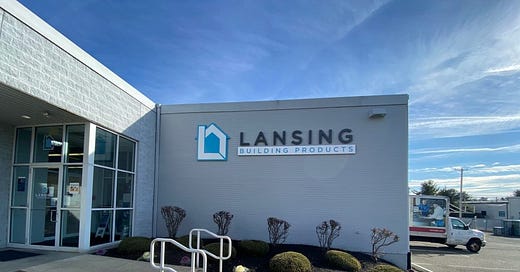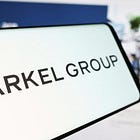Markel Ventures (MKL) — Unpacking Lansing Building Products
How a 70-year-old family distributor became Markel’s billion-dollar building materials play—and why most investors have never heard of it.
If you enjoy this post, you might also like my original Markel write up:
When Tom Gayner, Markel’s CEO, describes an investment as a “forever” holding, it immediately captures my attention. Gayner chooses his words deliberately, signaling exceptional conviction. Such was the case when Markel acquired Lansing Building Products in 2020—a third-generation family enterprise largely unnoticed by mainstream investors.
“In general, we hope to be able to buy a stock and never sell it. [...] I think that if you limit your buying to things you will be able to own for a long time, you will put more thought into whether to buy it or not and that leads to better long-term decisions."
— Tom Gayner
While discussions about Markel typically center around its insurance float and equity portfolio performance, the company has quietly cultivated an impressive stable of profitable, unassuming businesses through its Markel Ventures division. These include manufacturers of bakery equipment, educational service providers, and distributors of construction materials—exactly the types of businesses that resonate with investors like Warren Buffett.
Today, I’m be digging into Lansing.
Company Overview
Lansing Building Products was founded in Richmond, Virginia, in 1955 by Ted Lansing as a modest supplier specializing initially in aluminum siding. What began as a small, single-location business steadily grew into an important regional supplier, driven by a steadfast commitment to customer service, product quality, and local market relationships.
Under Ted Lansing’s leadership, the company expanded its product lines and geographical footprint throughout the southeastern United States. His son, Bill Lansing, subsequently took over, leading the company through sustained, disciplined growth over multiple decades. Bill reinforced a customer-centric approach, deepening relationships with professional contractors and positioning Lansing as an essential partner rather than just a supplier.
In recent decades, Lansing continued its geographic and product-line expansion, offering a broader range of exterior building products including roofing, siding, windows, decking, gutters, and related accessories. This growth was methodical, prioritizing long-term customer relationships and reliability over rapid, unchecked expansion.
Today, Lansing operates an expansive network of 113 branches across 35 states, serving thousands of contractors. Its reputation for consistent, high-quality service, deep local market knowledge, and reliable logistics management has made it a preferred supplier for professional contractors across the country.
The 2020 merger with Harvey Building Products’ distribution business significantly enhanced Lansing’s geographic reach and scale. This transformative acquisition was supported financially and strategically by Markel Ventures, marking a pivotal moment in Lansing’s history. The combined entity quickly established itself as a major national player while maintaining its unique, family-oriented approach and operational agility.
Hunter Lansing, grandson of founder Ted Lansing and current President and CEO, has clearly articulated the rationale for the Markel partnership:
“Markel Ventures focuses on building lasting partnerships, pursuing long-term financial performance, maintaining strong balance sheets, and empowering management teams to run their businesses.”
— Hunter Lansing
Industry Overview and Positioning
The building materials distribution industry has enjoyed robust growth, driven by several factors including an aging U.S. housing stock, ongoing infrastructure development, and steady demand from the professional contractor segment. Recent market data values the U.S. lumber and building materials industry at approximately $145.4 billion in 2024, with continued growth anticipated despite the significant competitive landscape dominated by giants such as Home Depot, Lowe’s, ABC Supply, and Beacon Roofing Supply.
Keep reading with a 7-day free trial
Subscribe to Coughlin Capital to keep reading this post and get 7 days of free access to the full post archives.





